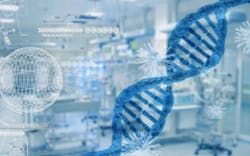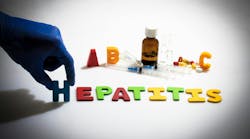New findings by scientists at the National Institutes of Health (NIH) and their collaborators help explain why some people with COVID-19 develop severe disease, according to a press release from the NIH. The findings also may provide the first molecular explanation for why more men than women die from COVID-19.
The researchers found that more than 10 percent of people who develop severe COVID-19 have misguided antibodies―autoantibodies―that attack the immune system rather than the virus that causes the disease. Another 3.5 percent or more of people who develop severe COVID-19 carry a specific kind of genetic mutation that impacts immunity. Consequently, both groups lack effective immune responses that depend on type I interferon, a set of 17 proteins crucial for protecting cells and the body from viruses. Whether these proteins have been neutralized by autoantibodies or―because of a faulty gene―were produced in insufficient amounts or induced an inadequate antiviral response, their absence appears to be a commonality among a subgroup of people who suffer from life-threatening COVID-19 pneumonia.
These findings are the first published results from the COVID Human Genetic Effort, an international project spanning more than 50 genetic sequencing hubs and hundreds of hospitals. The effort is co-led by Helen Su, MD, PhD, a senior investigator at the National Institute of Allergy and Infectious Diseases (NIAID), part of NIH; and Jean-Laurent Casanova, MD, PhD, head of the St. Giles Laboratory of Human Genetics of Infectious Diseases at The Rockefeller University in New York. The wide variation in the severity of disease caused by SARS-CoV-2, the virus behind COVID-19, has puzzled scientists and clinicians. SARS-CoV-2 can cause anything from a symptom-free infection to death, with many different outcomes in between. Since February 2020, Drs. Su and Casanova and their collaborators have enrolled thousands of COVID-19 patients to find out whether a genetic factor drives these disparate clinical outcomes.
The researchers discovered that among nearly 660 people with severe COVID-19, a significant number carried rare genetic variants in 13 genes known to be critical in the body’s defense against influenza virus, and more than 3.5 percent were completely missing a functioning gene. Further experiments showed that immune cells from those 3.5 percent did not produce any detectable type I interferons in response to SARS-CoV-2.
Examining nearly 1,000 patients with life-threatening COVID-19 pneumonia, the researchers also found that more than 10 percent had autoantibodies against interferons at the onset of their infection, and 95 percent of those patients were men. Biochemical experiments confirmed that the autoantibodies block the activity of interferon type I.





